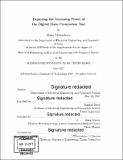| dc.contributor.advisor | Randall Davis. | en_US |
| dc.contributor.author | Mukusheva, Dana. | en_US |
| dc.contributor.other | Massachusetts Institute of Technology. Department of Electrical Engineering and Computer Science. | en_US |
| dc.date.accessioned | 2019-07-18T20:33:32Z | |
| dc.date.available | 2019-07-18T20:33:32Z | |
| dc.date.copyright | 2017 | en_US |
| dc.date.issued | 2017 | en_US |
| dc.identifier.uri | https://hdl.handle.net/1721.1/121822 | |
| dc.description | Thesis: M. Eng., Massachusetts Institute of Technology, Department of Electrical Engineering and Computer Science, 2017 | en_US |
| dc.description | Cataloged from PDF version of thesis. | en_US |
| dc.description | Includes bibliographical references (pages 65-66). | en_US |
| dc.description.abstract | The Digital Maze Completion Test is a novel and unique screening tool for dementia and related cognitive diseases. The test incorporates a combination of a digitizing pen, carefully designed mazes, and sophisticated software. The subject's behavior while solving the maze has potential to reveal the nuances in their cognitive state, which can be used for early diagnosis of impairments such as Alzheimer's disease. In this thesis, we explored the subject's decision making process and planning ability by interpreting and analyzing the relevant data collected by the digitizing pen. We came up with definitions of the associated features that we implemented in the software and extracted from the real-world clinical data. We have evaluated the predictive power of some of the features by applying machine learning classifiers to distinguish the individuals from the various clinical subgroups, such as healthy controls, subjects with Mild Cognitive Impairment, etc. Our key observation is that even a simple subset of the features is quite powerful to perform on par with the traditional screening tools, such as Mini-Mental State Examination. Therefore, we confirmed that the Digital Maze Completion Test is a promising screening tool, the further development and research of which will help to reveal more information about the patients' cognitive conditions. | en_US |
| dc.description.sponsorship | Supported in part by National Science Foundation Award IIS-1404494 and by the Robert E. Wise Research and Education Institution | en_US |
| dc.description.statementofresponsibility | by Dana Mukusheva. | en_US |
| dc.format.extent | 66 pages | en_US |
| dc.language.iso | eng | en_US |
| dc.publisher | Massachusetts Institute of Technology | en_US |
| dc.rights | MIT theses are protected by copyright. They may be viewed, downloaded, or printed from this source but further reproduction or distribution in any format is prohibited without written permission. | en_US |
| dc.rights.uri | http://dspace.mit.edu/handle/1721.1/7582 | en_US |
| dc.subject | Electrical Engineering and Computer Science. | en_US |
| dc.title | Exploring the screening power of the Digital Maze Completion test | en_US |
| dc.type | Thesis | en_US |
| dc.description.degree | M. Eng. | en_US |
| dc.contributor.department | Massachusetts Institute of Technology. Department of Electrical Engineering and Computer Science | en_US |
| dc.identifier.oclc | 1103917934 | en_US |
| dc.description.collection | M.Eng. Massachusetts Institute of Technology, Department of Electrical Engineering and Computer Science | en_US |
| dspace.imported | 2019-07-18T20:33:28Z | en_US |
| mit.thesis.degree | Master | en_US |
| mit.thesis.department | EECS | en_US |
